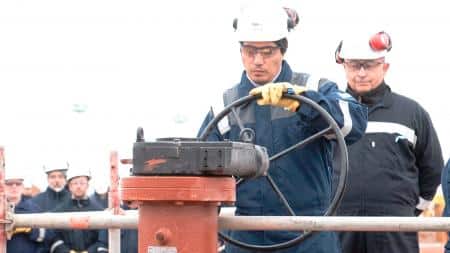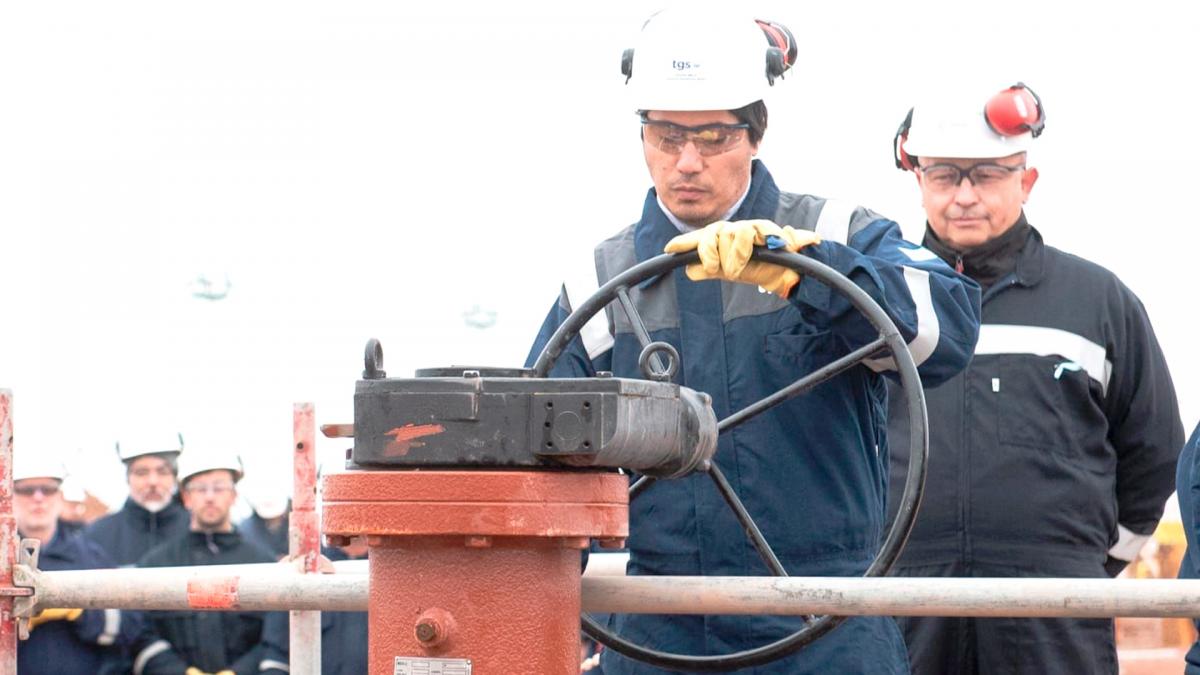 Photo: Press.
Photo: Press.
The Minister of Economy, Sergio Massa, affirmed that the work on the Néstor Kirchner Gas Pipeline “changes the history of the Argentine energy and productive matrix”, which “stopped for years due to lack of strategic vision and lack of courage”.
“When there is courage and decision, a work that changes the history of the Argentine energy and productive matrix can be done”said Massa.
On Twitter, he pointed out that “they said it was a 24-month work. And it was impossible to do it in 8”, and recalled that “this work was planned in 2015”.
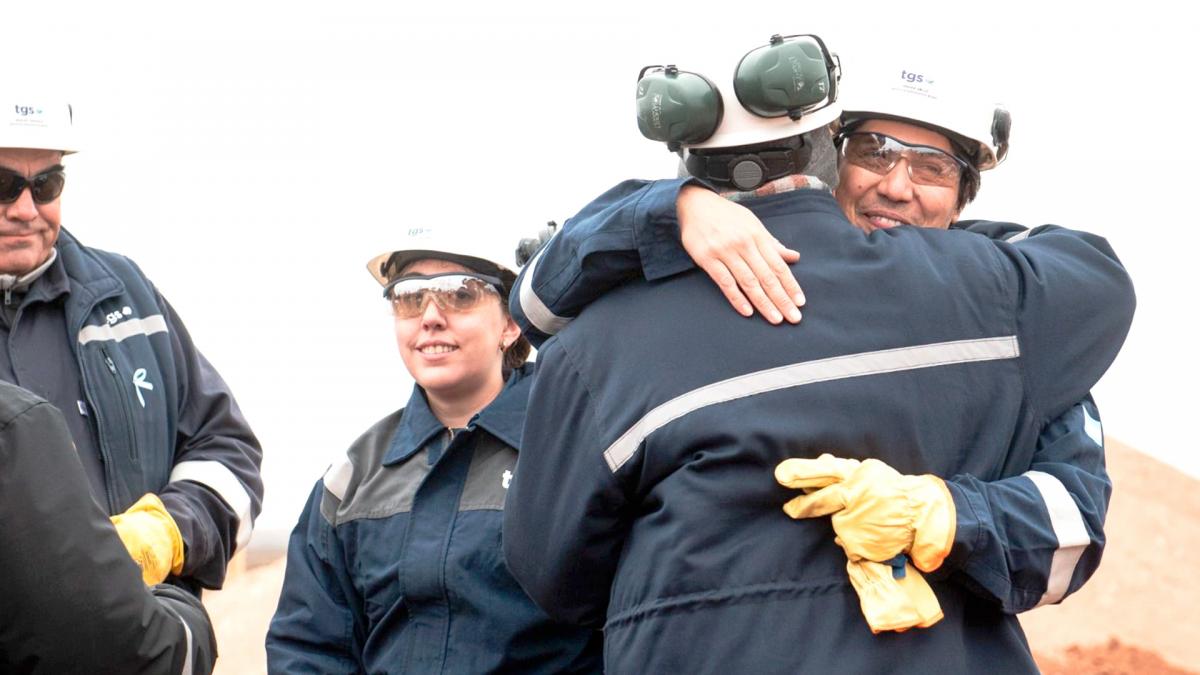 Photo: Press.
Photo: Press.
“He stopped for years due to a lack of strategic vision and a lack of courage,” he added.
The minister said that with the completion of the first tranche “we made the impossible possible.”
They said it was a 24 month job. And it was impossible to do it in 8.
This work was planned in 2015. It was stopped for years due to lack of strategic vision and lack of courage.We made the impossible possible.
Thanks to @FlaviaRoyon and the @Energia_Ar team
Thanks to Agustín… pic.twitter.com/tDO2Mik2mR— Sergio Massa (@SergioMassa) June 20, 2023
This Tuesday, with the opening of the first valve, the filling process of the President Néstor Kirchner pipeline begins, which will carry gas from the Vaca Muerta unconventional hydrocarbons field in Neuquén to the town of Salliqueló in the province of Buenos Aires, began this Tuesday and will conclude on July 9 when the the official inauguration of this first section of the pipeline.
The pipeline filling process It responds to usual procedures in this type of system, which involves progressive phases of sweeping and pressurizing the pipes.
The authorities of the energy area set a schedule for authorizations and commissioning of the first section of 573 kilometers, which goes from the Neuquén town of Tratayén to Salliqueló, in the province of Buenos Aires.
Today is a historic day! We started in Tratayén, Neuquén, the filling of the #GasoductoPresidenteNéstorKirchner, the work that transforms our country, which we carry out together with @Economia_Ar and @Energia_Ar. pic.twitter.com/bSQ6Ysk08o
– Argentine Energy (@Energia_ArgOk) June 20, 2023
In statements to Télam Radio, the Secretary of Energy, Flavia Royon, stressed that the work was done “in record time”, and stated that will allow “a production leap” in Vaca Muerta and will lead Argentina to energy self-sufficiency.
“Vaca Muerta is the second unconventional gas reserve in the world and it is in Argentina and we had limited infrastructure to take advantage of it” Flavia Royon
“It is a very important work because it was done in record time, the work that was carried out between Enarsa, the contractors that were involved, the workers, the minister (Sergio) Massa, who was personally on top of this work so that it was can execute in this record time”, he affirmed.
He said that “Vaca Muerta is the second unconventional gas reserve in the world and it is in Argentina and we had limited infrastructure to be able to take advantage of it” and that “from the construction of this gas pipeline, it will be possible to make a leap in production”.
Full interview with Flavia Royon.
Likewise, he pointed out that “with this first work, Argentina will not again make important purchases of LNG, liquefied gas from other parts of the world”, and “when the second stage is finished, Argentina will lead to self-sufficiency of more than 95%”.
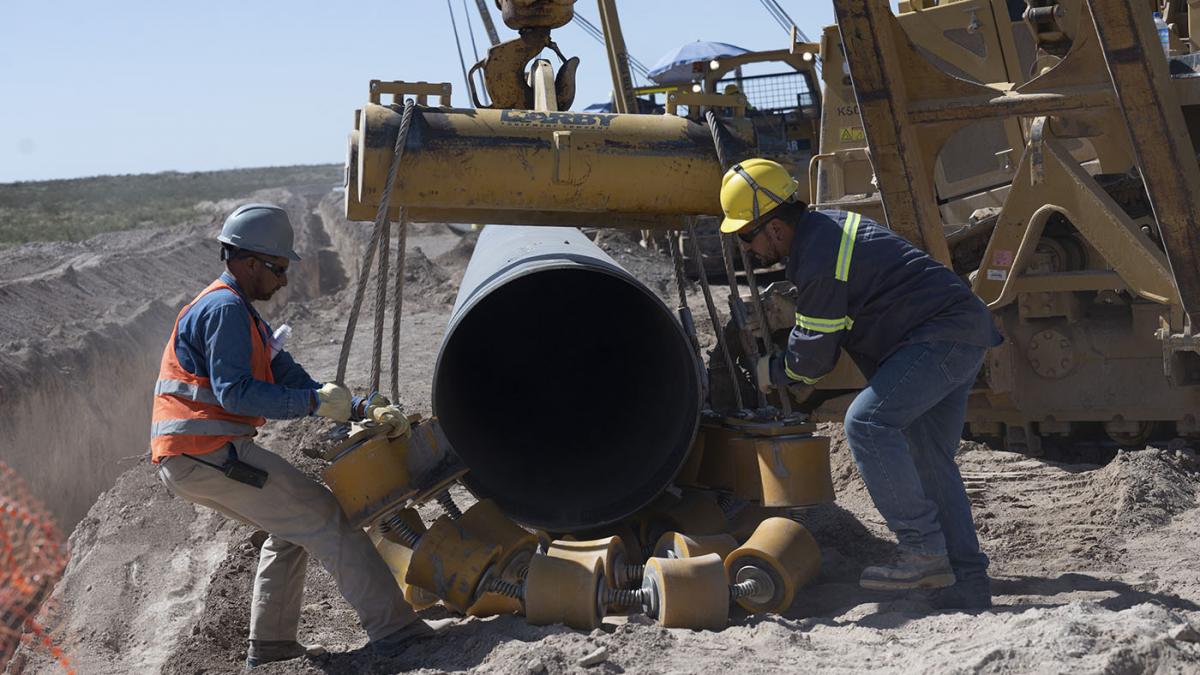 The engineering work, considered the most important in the last 50 years, was completed in a record period of 10 months / Photo: Victoria Gesualdi.
The engineering work, considered the most important in the last 50 years, was completed in a record period of 10 months / Photo: Victoria Gesualdi.
“This will result in the fact that we are going to have a more robust matrix, we are not going to depend on international prices or international crises,” as well as “it will make it possible for us to export gas to our neighboring countries first.”
“The energy sector is going to consolidate as the second sector that generates foreign currency for our country” Flavia Royon
He assured that this work “will also enable the development of associated oil, and thus our energy balance will go from being negative this year to being in balance and from there it begins to be positive until 2030 when we project 18 billion dollars positive”.
“The energy sector is going to consolidate as the second sector that generates foreign currency for our country,” he remarked.
Royon considered that “Argentina needs to diversify its export matrix, which today is more concentrated in agriculture, the energy sector will play there, but clearly to be able to think about exports.”
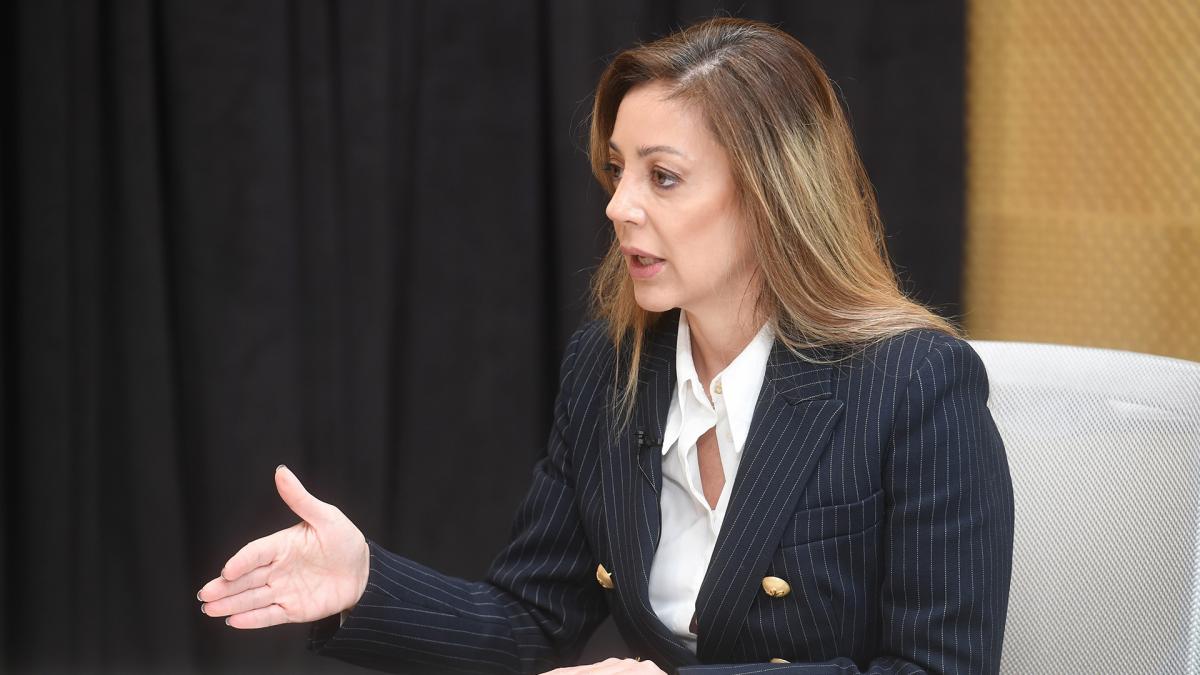 Royon assured that this work “will also enable the development of associated oil / Photo: Alejandro Santa Cruz.
Royon assured that this work “will also enable the development of associated oil / Photo: Alejandro Santa Cruz.
Gerez: “This work definitely leads the country to energy sovereignty”
The president of the state company Energía Argentina (formerly Enarsa), Agustín Gerez, stressed that the Néstor Kirchner Gas Pipeline “definitely leads” the country towards energy sovereignty, while calling the former Minister of Economy, Martín Guzmán, a “scoundrel” for having “paralyzed” the work in its beginnings.
“Today we can be inaugurating this historic milestone that definitively leads us towards what we longed for back in 2012, which is energy sovereignty,” Gerez said this morning in dialogue with Radio 10, on the occasion of the gas pipeline filling process, which begins today and will conclude on July 9 when the official inauguration of this first section of the pipeline takes place.
Gerez considered that it is a “day of enormous pride” after having gone through “a very complicated and complex process and project in a very delicate national and international situation”, but that he knew that “effort, dedication and work give its fruits”.
“Today we can be inaugurating this historic milestone that definitively leads us towards what we longed for back in 2012, which is energy sovereignty” Agustín Gerez
In this sense, he thanked the deputy of the Frente de Todos (FdT), maximum kirchner, for “sanctioning the solidarity contribution that was key to financing this project”; to Vice President Cristina Fernández de Kirchner, who “made the political decision to carry it out”; and to the Minister of Economy, Sergio Massa, for having been “fundamental and key to coordinating all areas of the State”.
The head of Energía Argentina emphasized the benefits that the gas pipeline will bring not only to the macroeconomy but also to the microeconomy.
“We import US$8.5 billion annually between liquid fuels and gas. For our country’s industries, prices range between US$4 and US$10 per million BTU, which is the import price,” he explained.
After which, Gerez indicated that, when industries and homes can be supplied with locally produced gas, it will be possible to do so “at a more competitive price”.
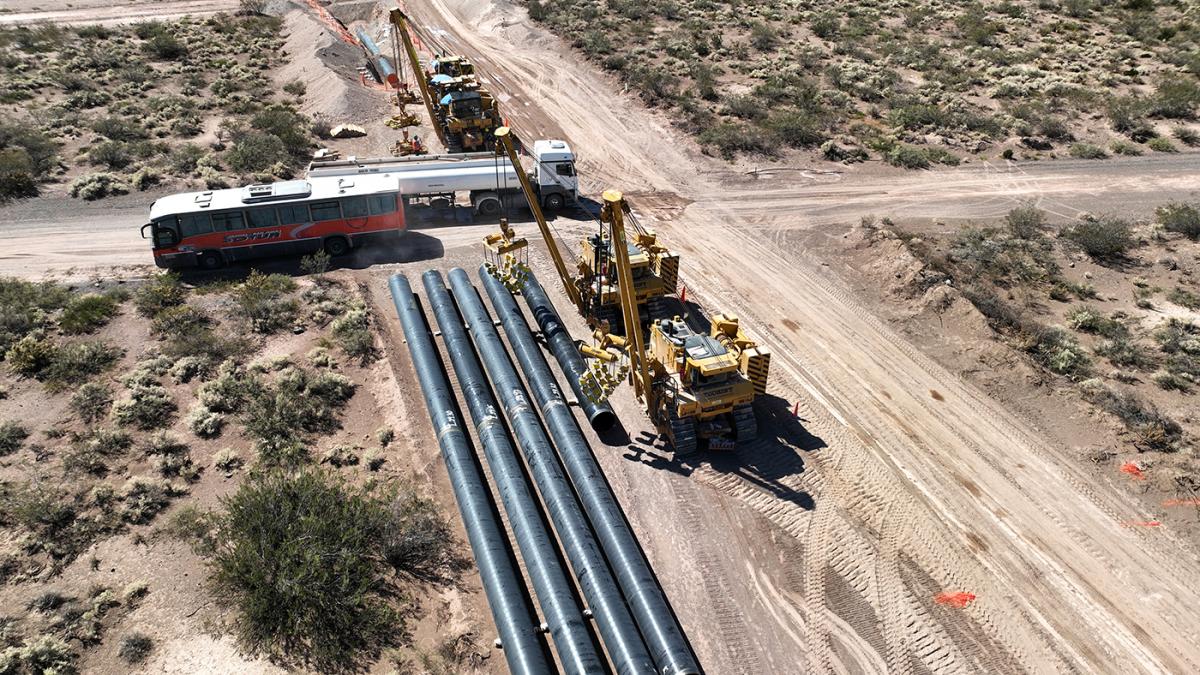 The gas pipeline filling process follows normal procedures in this type of system / Photo: Victoria Gesualdi.
The gas pipeline filling process follows normal procedures in this type of system / Photo: Victoria Gesualdi.
For his part, the official questioned the former Minister of Economy, Martín Guzmán, for having placed “impediments” when starting the project.
“Last night I had to read a column that was published in one of the most important information portals that was written by (former) Minister Guzmán, and I could not believe the level of cheekiness and how shameless he was when expressing with absolute naturalness a project in which it was one of the biggest impediments he had to be able to materialize”, he said.
Gerez referred to the opinion article entitled A gas pipeline for development, which was written by Guzmán and published on the Infobae portal.
“He had in his office for 84 days paralyzed the Decree of Necessity and Urgency that instructed us to start this project”he stated, noting that Massa’s subsequent arrival at the Palacio de Hacienda “gave a dynamism and an imprint (to the work) without which it could not have been carried out in record time as we did it”.
“This project could have been ready 84 days earlier if we hadn’t been held hostage to one person’s whims,” Gerez criticized.
The most important work of the last 50 years
The filling process contemplates that this Tuesday the section that goes from kilometer 0 of the gas pipeline to kilometer 29 will be enabled.
On June 25, the section that goes from kilometer 29 to 61 will be enabled, to which four more stages will be added until full authorization to Salliqueló.
While, The official inauguration of the first section of the President Néstor Kirchner Gas Pipeline is scheduled for next July 9.
The engineering work, considered the most important in the last 50 years, was completed in a record period of 10 months, crossed four provinces: from the gas treatment plant in Tratayen, located in the heart of Vaca Muerta, passing through Río Negro, La Pampa, to Salliqueló.
“The gas pipeline is essential to supply the domestic market with natural gas”
The inauguration of the first section of the Néstor Kirchner Gas Pipeline “is essential to supply the domestic market with natural gas” and will mean “reducing energy imports by a fifth,” said the director of the Energy Institute of the Austral University, Roberto Carnicer.
“The work that is inaugurated is essential to supply the internal market with natural gas, which will represent a fifth reduction in the importation of energy (Gas and imported Gas Oil)”said Carnicer in a report released on the day that the filling of the Gas Pipeline begins.
He said that “it is the first link in the infrastructure necessary to solve the supply logistics and arrive with gas from Vaca Muerta to the centers of greatest demand in Argentina.”
He considered that “there is still much more to do: the second stage of the Néstor Kirchner pipeline, the reversal of the Northern pipeline to take VM gas to the north, the liquefaction plant (LNG) projects, the gas monetization projects (petrochemicals), and also the crude oil pipelines (oldelval, Trasandino, Vaca Muerta Norte, Vaca Muerta Sur)”.
“The great success is having carried out this project within a fairly tight deadline, given the macroeconomic characteristics of the country”he stressed.
On the other hand, Carnicer pointed out that “the new investment bill to encourage the export of natural gas in the form of liquefied natural gas is essential, and very appropriate for the circumstances that our country is going through.”
“This new project tries to solve a self-inflicted problem that is known to all and that was not successful in past decades. The concepts of an imperative need to be gas exporters are written in the recitals of the law, not only for what what that means for our country, but as an instrument for the global energy transition,” he added.
He maintained that “the most valuable thing is to recognize in the written letter that of reversing certain political behaviors that undermined our international prestige, such as, among others, the need for regulatory stability clauses, for example transport and supply guarantees, and authorizations firm export of LNG”.
“Argentina does not have time to lose, it needs to plan to be effective and efficient, and encourage investment to be a great energy exporter,” concluded Carnicer.


